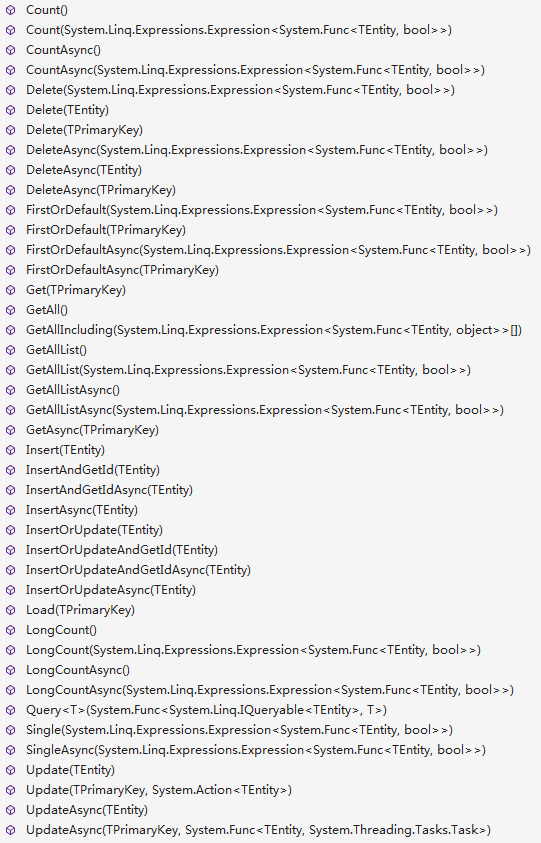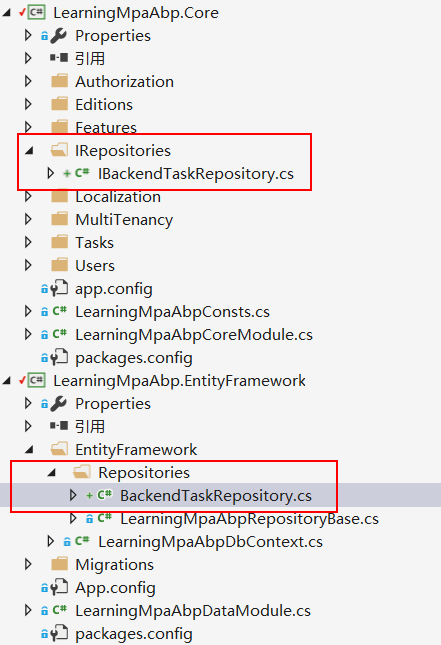 Backend Development
Backend Development
 C#.Net Tutorial
C#.Net Tutorial
 ABP introductory series (4) - Domain layer definition and implementation of warehousing
ABP introductory series (4) - Domain layer definition and implementation of warehousing
ABP introductory series (4) - Domain layer definition and implementation of warehousing
Repository: Repository is used to operate the database for data access. The warehousing interface is defined at the domain layer, while the warehousing implementation class should be written at the infrastructure layer.
In ABP, the warehousing class must implement the IRepository interface, which defines commonly used addition, deletion, modification, and aggregation methods, including synchronous and asynchronous methods. It mainly includes the following methods:

ABP provides a default implementation of this interface for different ORM frameworks;
For EntityFramework, Provides an implementation of the generic version of EfRepositoryBase
For NHibernate, the implementation of the generic version of NhRepositoryBase
The implementation of the generic version means that most of the time, these methods are sufficient to meet the needs of general entities. If these methods are sufficient for the entity, we don't need to create the repository interface/class required by this entity.
You can directly define the warehouse reference in the application service layer and then inject it through the constructor. Task warehousing can be used in our application service layer in the following way:
public class TaskAppService : ITaskAppService {
private readonly IRepository<Task> _taskRepository;
public TaskAppService(IRepository<Task> taskRepository)
{
_taskRepository = taskRepository;
}This is the method used in the sample code
2. How to implement custom warehousing
Suppose we need to find out which tasks a user has been assigned.
In the domain layer, create the IRepositories folder, and then define IBackendTaskRepository.
namespace LearningMpaAbp.IRepositories
{/// <summary>/// 自定义仓储示例/// </summary>public interface IBackendTaskRepository : IRepository<Task>
{ /// <summary>
/// 获取某个用户分配了哪些任务
/// </summary>
/// <param name="personId">用户Id</param>
/// <returns>任务列表</returns>
List<Task> GetTaskByAssignedPersonId(long personId);
}
}In the infrastructure layer, the warehousing is implemented.
namespace LearningMpaAbp.EntityFramework.Repositories
{public class BackendTaskRepository:LearningMpaAbpRepositoryBase<Task>,IBackendTaskRepository{
public BackendTaskRepository(IDbContextProvider<LearningMpaAbpDbContext> dbContextProvider) : base(dbContextProvider)
{
} /// <summary>
/// 获取某个用户分配了哪些任务
/// </summary>
/// <param name="personId">用户Id</param>
/// <returns>任务列表</returns>
public List<Task> GetTaskByAssignedPersonId(long personId)
{ var query = GetAll(); if (personId>0)
{
query = query.Where(t => t.AssignedPersonId == personId);
} return query.ToList();
}
}
}This warehouse implementation inherits from the LearningMpaAbpRepositoryBase generic abstract class generated by the template, and then implements the IBackendTaskRepository interface. Here you need to explicitly declare the parameterized constructor of the implementation class, and use the generic IDbContextProvider to pass the database context subclass ChargeStationContext to the constructor of the parent class.

3. Warehousing precautions
In the warehousing method, ABP automatically opens and closes the database connection.
When the warehousing method is called, the database connection is automatically opened and the transaction is started.
When a repository method calls another repository method, they actually share the same database connection and transaction.
Repository objects are temporary because the IRepository interface inherits from the ITransientDependency interface by default. Therefore, the IOC container will automatically create a new instance of the warehousing object only when it needs to be injected.
The default generic repository can meet most of our needs. Only if this is not satisfied will a customized repository be created.
The source code has been uploaded to Github-LearningMpaAbp, you can refer to it yourself.
ABP introductory series directory - practical exercises for learning the Abp framework
The above is the ABP introductory series (4) - the content of defining warehousing and implementation at the domain layer. For more related content, please pay attention to the PHP Chinese website (www.php.cn)!

Hot AI Tools

Undresser.AI Undress
AI-powered app for creating realistic nude photos

AI Clothes Remover
Online AI tool for removing clothes from photos.

Undress AI Tool
Undress images for free

Clothoff.io
AI clothes remover

Video Face Swap
Swap faces in any video effortlessly with our completely free AI face swap tool!

Hot Article

Hot Tools

Notepad++7.3.1
Easy-to-use and free code editor

SublimeText3 Chinese version
Chinese version, very easy to use

Zend Studio 13.0.1
Powerful PHP integrated development environment

Dreamweaver CS6
Visual web development tools

SublimeText3 Mac version
God-level code editing software (SublimeText3)

Hot Topics
 1660
1660
 14
14
 1416
1416
 52
52
 1310
1310
 25
25
 1260
1260
 29
29
 1233
1233
 24
24
 C# .NET Interview Questions & Answers: Level Up Your Expertise
Apr 07, 2025 am 12:01 AM
C# .NET Interview Questions & Answers: Level Up Your Expertise
Apr 07, 2025 am 12:01 AM
C#.NET interview questions and answers include basic knowledge, core concepts, and advanced usage. 1) Basic knowledge: C# is an object-oriented language developed by Microsoft and is mainly used in the .NET framework. 2) Core concepts: Delegation and events allow dynamic binding methods, and LINQ provides powerful query functions. 3) Advanced usage: Asynchronous programming improves responsiveness, and expression trees are used for dynamic code construction.
 C# .NET: Exploring Core Concepts and Programming Fundamentals
Apr 10, 2025 am 09:32 AM
C# .NET: Exploring Core Concepts and Programming Fundamentals
Apr 10, 2025 am 09:32 AM
C# is a modern, object-oriented programming language developed by Microsoft and as part of the .NET framework. 1.C# supports object-oriented programming (OOP), including encapsulation, inheritance and polymorphism. 2. Asynchronous programming in C# is implemented through async and await keywords to improve application responsiveness. 3. Use LINQ to process data collections concisely. 4. Common errors include null reference exceptions and index out-of-range exceptions. Debugging skills include using a debugger and exception handling. 5. Performance optimization includes using StringBuilder and avoiding unnecessary packing and unboxing.
 Testing C# .NET Applications: Unit, Integration, and End-to-End Testing
Apr 09, 2025 am 12:04 AM
Testing C# .NET Applications: Unit, Integration, and End-to-End Testing
Apr 09, 2025 am 12:04 AM
Testing strategies for C#.NET applications include unit testing, integration testing, and end-to-end testing. 1. Unit testing ensures that the minimum unit of the code works independently, using the MSTest, NUnit or xUnit framework. 2. Integrated tests verify the functions of multiple units combined, commonly used simulated data and external services. 3. End-to-end testing simulates the user's complete operation process, and Selenium is usually used for automated testing.
 From Web to Desktop: The Versatility of C# .NET
Apr 15, 2025 am 12:07 AM
From Web to Desktop: The Versatility of C# .NET
Apr 15, 2025 am 12:07 AM
C#.NETisversatileforbothwebanddesktopdevelopment.1)Forweb,useASP.NETfordynamicapplications.2)Fordesktop,employWindowsFormsorWPFforrichinterfaces.3)UseXamarinforcross-platformdevelopment,enablingcodesharingacrossWindows,macOS,Linux,andmobiledevices.
 The Continued Relevance of C# .NET: A Look at Current Usage
Apr 16, 2025 am 12:07 AM
The Continued Relevance of C# .NET: A Look at Current Usage
Apr 16, 2025 am 12:07 AM
C#.NET is still important because it provides powerful tools and libraries that support multiple application development. 1) C# combines .NET framework to make development efficient and convenient. 2) C#'s type safety and garbage collection mechanism enhance its advantages. 3) .NET provides a cross-platform running environment and rich APIs, improving development flexibility.
 Advanced C# .NET Tutorial: Ace Your Next Senior Developer Interview
Apr 08, 2025 am 12:06 AM
Advanced C# .NET Tutorial: Ace Your Next Senior Developer Interview
Apr 08, 2025 am 12:06 AM
Interview with C# senior developer requires mastering core knowledge such as asynchronous programming, LINQ, and internal working principles of .NET frameworks. 1. Asynchronous programming simplifies operations through async and await to improve application responsiveness. 2.LINQ operates data in SQL style and pay attention to performance. 3. The CLR of the NET framework manages memory, and garbage collection needs to be used with caution.
 Is C# .NET Right for You? Evaluating its Applicability
Apr 13, 2025 am 12:03 AM
Is C# .NET Right for You? Evaluating its Applicability
Apr 13, 2025 am 12:03 AM
C#.NETissuitableforenterprise-levelapplicationswithintheMicrosoftecosystemduetoitsstrongtyping,richlibraries,androbustperformance.However,itmaynotbeidealforcross-platformdevelopmentorwhenrawspeediscritical,wherelanguageslikeRustorGomightbepreferable.
 C# as a Versatile .NET Language: Applications and Examples
Apr 26, 2025 am 12:26 AM
C# as a Versatile .NET Language: Applications and Examples
Apr 26, 2025 am 12:26 AM
C# is widely used in enterprise-level applications, game development, mobile applications and web development. 1) In enterprise-level applications, C# is often used for ASP.NETCore to develop WebAPI. 2) In game development, C# is combined with the Unity engine to realize role control and other functions. 3) C# supports polymorphism and asynchronous programming to improve code flexibility and application performance.



